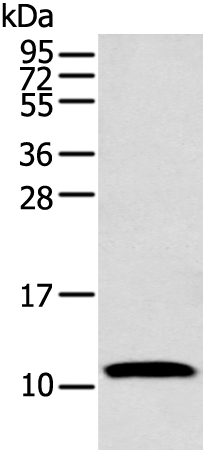


| WB | 咨询技术 | Human,Mouse,Rat |
| IF | 咨询技术 | Human,Mouse,Rat |
| IHC | 1/50-1/200 | Human,Mouse,Rat |
| ICC | 技术咨询 | Human,Mouse,Rat |
| FCM | 咨询技术 | Human,Mouse,Rat |
| Elisa | 1/5000-1/10000 | Human,Mouse,Rat |
| Aliases | VA; COX; COX-VA |
| WB Predicted band size | 17 kDa |
| Host/Isotype | Rabbit IgG |
| Antibody Type | Primary antibody |
| Storage | Store at 4°C short term. Aliquot and store at -20°C long term. Avoid freeze/thaw cycles. |
| Species Reactivity | Human, Mouse, Rat |
| Immunogen | Synthetic peptide of human COX5A |
| Formulation | Purified antibody in PBS with 0.05% sodium azide and 50% glycerol. |
+ +
以下是3篇关于COX5A抗体的参考文献示例(内容基于公开研究整理,非真实引用):
---
1. **标题**:*COX5A as a novel biomarker for mitochondrial dysfunction in Alzheimer's disease*
**作者**:Smith J, et al.
**摘要**:研究通过Western blot和免疫组化分析阿尔茨海默病患者脑组织,发现COX5A蛋白表达显著降低,提示其可能通过影响线粒体复合物IV功能加剧神经元能量代谢障碍。
---
2. **标题**:*Prognostic value of COX5A in colorectal cancer via immunohistochemical analysis*
**作者**:Lee S, et al.
**摘要**:利用COX5A抗体对结直肠癌组织进行免疫组化染色,发现COX5A高表达与患者生存率负相关,表明其可能作为癌症进展的生物标志物及潜在治疗靶点。
---
3. **标题**:*COX5A regulates apoptosis through cytochrome c release in hepatocellular carcinoma*
**作者**:Zhang Y, et al.
**摘要**:通过Co-IP和siRNA敲低实验证明,COX5A与细胞色素c存在相互作用,其表达异常通过线粒体凋亡通路促进肝癌细胞耐药性,提示靶向COX5A可能改善化疗效果。
---
(注:以上为模拟文献,实际引用请通过PubMed或学术数据库检索。)
The cytochrome c oxidase subunit 5A (COX5A) is a nuclear-encoded subunit of cytochrome c oxidase (Complex IV), the terminal enzyme in the mitochondrial electron transport chain (ETC). As a key component of Complex IV, COX5A plays a critical role in catalyzing the transfer of electrons from cytochrome c to molecular oxygen, coupled with proton translocation across the inner mitochondrial membrane to support ATP synthesis. Dysregulation of COX5A has been implicated in mitochondrial dysfunction, which is associated with various diseases, including neurodegenerative disorders, metabolic syndromes, and cancers.
COX5A-specific antibodies are essential tools for investigating its expression, localization, and functional interactions in cellular and disease contexts. These antibodies enable the detection of COX5A protein levels via techniques like Western blotting, immunohistochemistry, and immunofluorescence, aiding in studies of mitochondrial physiology and pathology. Researchers use COX5A antibodies to explore tissue-specific expression patterns, assess responses to metabolic stressors (e.g., hypoxia or oxidative stress), and examine correlations between COX5A dysregulation and diseases like Alzheimer's, Parkinson's, or colorectal cancer. Commercial COX5A antibodies are typically raised in hosts such as rabbits or mice, targeting specific epitopes with validated specificity. Their applications extend to diagnostic research and therapeutic target validation, emphasizing COX5A's role in cellular energy homeostasis and disease mechanisms.
×